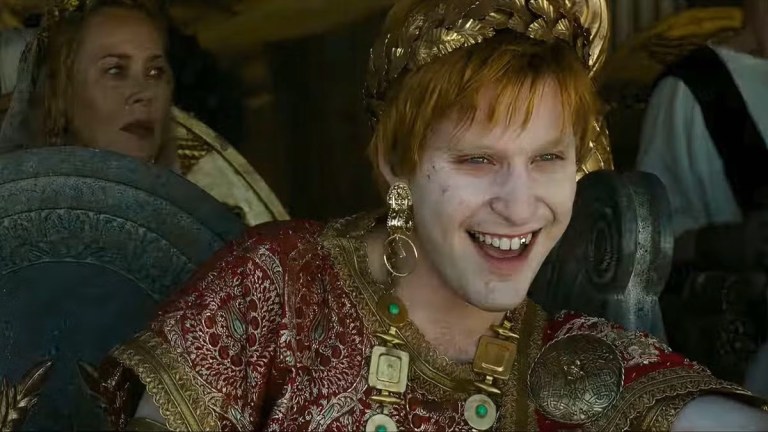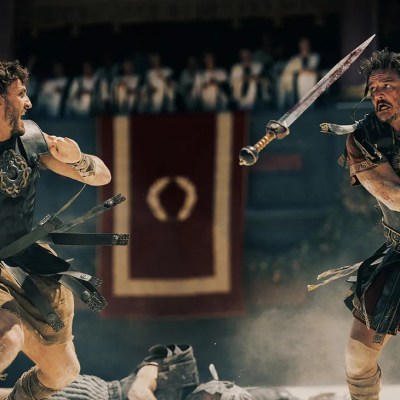Gladiator 2 Leaves Out Fascinating Real History of Emperor Caracalla
Gladiator II is great entertainment, but Ridley Scott missed the opportunity to tap into the provocative true story of when the movie is set.

This article contains major Gladiator II spoilers.
Denzel Washington is one of those truly gifted actors. The kind where watching him read from a tax return could be amusing. So witnessing him devour the scenery of Ancient Rome as the ambiguous, and ultimately sinister, Macrinus is nothing less than pure joy. Over the course of 148 minutes, Washington’s double-dealing social climber is able to manipulate every other character in the film and dominate each scene, right up until the end of the film where we learn Macrinus has nothing less than the throne in his sights.
During Gladiator II’s third act, Macrinus murders and beheads Emperor Geta (Joseph Quinn), the slightly older twin of his co-ruler, Emperor Caracalla (Fred Hechinger). Macrinus does this right in front of Caracalla, who is depicted as a syphilitic simpleton whose reason and intelligence has melted away because of the social disease. He endorses Geta’s murder and makes Macrinus Consul of Rome, with this once-lofty title dating back to Rome’s Republic days being only matched by Caracalla’s pet monkey, whom the emperor makes Macrinus’ co-consul.
In other words, Macrinus has full autonomy and power over the empire with Caracalla’s fading mind under his thrall. Yet even that is not good enough for the powerbroker. In the climax of the movie, Macrinus murders Caracalla and attempts to make himself the de facto emperor with the support of the Praetorian Guard. It’s an epic coup, one in which the motives remain vague, right down to what drives Macrinus beyond the fact that he was once enslaved by the imperial household of Marcus Aurelius, the so-called philosopher. Presumably, Macrinus was greatly abused in some way by the bondage of Rome and now seeks to destroy the empire from within. But to what end, and for what ultimate purpose, is never explained.
Perhaps because to imagine such a scenario would take Gladiator II even further away from history. Which is saying something since the film is already outright fantasy by this point. Admittedly it’s an exciting fantasy. But even so, it missed the chance to dig into the real history of Rome at the turn of the third century A.D. and to further tap into the modern anxieties Scott told Den of Geek he hoped Gladiator II would explore. In an interview with our magazine last month, the filmmaker posited “there’s no difference” between then and now. “It’s the same, except I think now it’s much worse.”
If that’s so, the reign of the real Caracalla, which did not include primate consuls and (as far as we know) was not marred by syphilis, is a missed opportunity for Scott to hold up a mirror to today. After all, this was the emperor who answered for good and all what it meant to be a Roman citizen when he sweepingly made all non-enslaved men throughout the empire citizens, changing the definition of what it means to be Roman after centuries of debate… and still getting assassinated by a man named Macrinus shortly thereafter.
The Real Caracalla and Geta
To get it out of the way, Caracalla was neither a twin to his brother Geta, nor the junior. His real name wasn’t even Caracalla, though modern historians use that nickname from his lifetime to differentiate him from his various namesakes (his real name when he assumed the throne was Marcus Aurelius Antoninus). Still, “Caracalla” and Geta did briefly rule together as the heirs of their father and the first of their dynasty, Emperor Septimius Severus.
So from the jump, you can guess what appears in Gladiator II is highly fictionalized. In 200 A.D., their father was still alive, and no monkey became consul—that amusing sequence seems rooted in appropriating the much debated claim about Caligula, an emperor who supposedly planned to make his horse a consul before his own assassination in in 41 A.D. In fact, almost everything we see about Caracalla and Geta’s reigns in Gladiator II is an invention for the film, beginning with the fact that they did not assume power between themselves until 211, 11 years after Gladiator II is set. Prior to that they ruled as co-emperors with their father, beginning in 198 for Caracalla and in 209 for his younger brother.
What is true in the film, though, is that Caracalla did witness the murder of his brother. In fact, he had it carried out, with Caracalla ordering the Praetorian Guard to assassinate Geta, which allegedly was executed as the still young man cried in their mother’s arms. This was not done because Caracalla was simple of mind, but ruthless and hungry of power. Much like the myth of Romulus and Remus, these co-emperors arguably represented the worst of their culture, or at least of politics in the imperial age.
After Geta’s assassination, Caracalla did not have a general named Marcus Acacius (who never existed) conquer Numidia, but that is because Numidia was conquered by the Romans about 150 years before Gladiator II is set. But Caracalla did dream of being a great ruler of conquest. He went so far as to gather his own armies and attempt to conquer the Parthian Empire (roughly modern day Iran) while having his forces emulate the now antiquated fighting styles of Alexander the Great. Caracalla is depicted by his contemporaries, who outlived his grim murder, as a tyrant who dreamed of replicating Alexander’s achievements.
He did not. With his own army weary of fighting, a member of his Praetorian Guard—and possibly Macrinus himself—slit Caracalla’s throat while the emperor was taking a pee on the side of the road. Macrinus shortly thereafter made himself emperor with the support of the Praetorian Guard, which was its own mild scandal since Macrinus was the first emperor who did not spring from the privileged senatorial class. But his reign was even shorter-lived than Caracalla’s six-year solo run. Macrinus was assassinated a year after killing Caracalla while the new emperor was fleeing an ignoble defeat. He never stepped foot inside of Rome.
A Failed Emperor Who Still Answered the ‘Real Roman’ Question
From a dramatist’s standpoint, it’s easy to look at what’s left of the historical record on Caracalla’s reign and dismiss him as a failure whose most interesting moment was the murder of his brother—though even that Gladiator II assigns to another character. This change was presumably done for the dramatic irony of having a man who might have been seen as an outsider to ancient Romans (Denzel Washington’s charismatic former slave) achieve total power over the emperors and empire.
But the intriguing thing is that Caracalla and Geta both were actually descended from an “outsider,” with their father Septimius Severus being the first Roman emperor to hail from an African province. Indeed, Septimius’ own grandfather is believed to have been half-Punic (North African), which has led modern scholars to debate whether Septimius was the first Black or biracial emperor. Such debates are ultimately fruitless, however, since Romans did not care about race like modern Westerners. They rarely recorded such details, because for them, generally, the only thing that mattered was if you were a Roman citizen or not. Everyone else was the barbarian.
The question of what it means to be a Roman citizen was in fact hotly debated by 200 A.D., which is where the real history becomes a great deal more interesting. Because in the centuries leading up to this point, citizenship could mean the difference between some semblance of upward mobility and servitude, the ability to vote for at least the Tribune of the People (plebeians) in the Republic days, and of course the ability to be viewed as a true Roman. It’s why the biblically sainted, and Roman, apostle Paul was afforded the privilege of being beheaded when it came down to dole out executions, whereas the non-citizen Peter was crucified.
What it meant to be Roman was such a pivotal concept to this society that in their founding myth (which is largely invented due to Rome’s origins reaching back into pre-history), it was said the supposed founder Romulus built his city by offering citizenship to any fugitive, former slave, or outlaw on the Italian peninsula who would come by the River Tiber and help him raise a community. In this sense, Romans were unique in the ancient world where they granted citizenship to anyone who was deemed worthy of being Roman.
This is different from our modern idea of citizenship where tests are required, flags saluted, and fees and taxes paid. To the Romans, citizenship was a gift often awarded to those who lived in their provinces and served successfully in the military (and survived the ordeal). It was also awarded to local officials in Rome’s many provinces (enemies might also call them collaborators). If a slave was freed, or bought their freedom, which was much more common in the ancient world than our image from Western chattel slavery, they were automatically granted citizenship—though that certainly does not excuse the still insidious institution and the its myriad horrors in the Roman world.
To put it another way, by 200 A.D., when Gladiator II is set, it is estimated that 20 percent of the free population throughout an empire that spanned from Britannia to Egypt were citizens. That’s about 10 million people not living in the city of Rome itself, according to classist and former University of Cambridge Professor Mary Beard. It is for that reason Beard ended her sublime popular history on Rome’s “first millennium,” SPQR: A History of Ancient Rome, on Emperor Caracalla and the one profound thing he did: essentially creating a kind of birthright citizenship by making all free men living in the empire citizens.
In 212 A.D., Caracalla issued the Antonine Constitution, an edict that provided citizenship to most men within Rome’s vast borders. More than 30 million people became Roman citizens overnight, making it arguably the greatest grant of mass assimilation in world history. It also (temporarily) solved a question which Italians killed themselves over back in the Republic days during the Social War of the first century B.C. That was a war fought between Rome and nearby neighbors who grew tired of being part of the empire without enjoying the perks of citizenship.
Why Caracalla created such a radical reform has puzzled historians since his lifetime to today. A popular theory first suggested by Lucius Cassius Dio, who was alive during Caracalla’s reign, suggests the bloodthirsty emperor did this to raise a new tax on 30 million people who now had to pay the citizen’s inheritance tax. Beard, however, notes that that would have been a particularly cumbersome and unwieldy way for an autocrat to simply create a new tax.
Whatever his motives, Caracalla sought to answer the question of who counts as a Roman, and with his death the empire itself seemed to enter a new phase, beginning with Macrinus becoming the first of (many) Roman emperors who were not born from the most elite element of the patrician class.
A Lost Opportunity
At a glance, the politics of Roman citizenship is not nearly so exciting as seeing a Colosseum filled with battleships and sharks. And Scott’s desire to create a movie where a wealthy outsider—be he from northern Africa or modern day South Africa–using his wealth to purchase influence in the ear of a would-be god-king certainly has modern echoes.
Yet the film also leaves itself open to a more chilling reading where Washington’s fictionalized and formerly enslaved Macrinus proved that outsiders cannot be trusted, as he literally schemes to destroy the empire from within. Conversely, the real Caracalla was descended from a lineage that a few generations earlier was half-African, and he attempted to change the paradigm of what counts as a “true” Roman. And even then, his attempt to make a change failed. After Caracalla’s assassination, new standards of what it means to be a “real” Roman changing as the new century saw future leaders divide Romans between honestiories (“the most honorable,” referring to the rich elite and veterans of the armies) and the humilories (“the lower sort,” which was everyone else).
Given how the concept of birthright citizenship in the U.S. is about to come under heavy attack in 2025, a Gladiator II that leaned into that debate in Roman times might have proven a little more prescient than a film that is ultimately about a prodigal Roman son skewering an interloper and saboteur. Something to think about between the stabby bits the next time you go to the arena.
Gladiator II is in theaters now.


